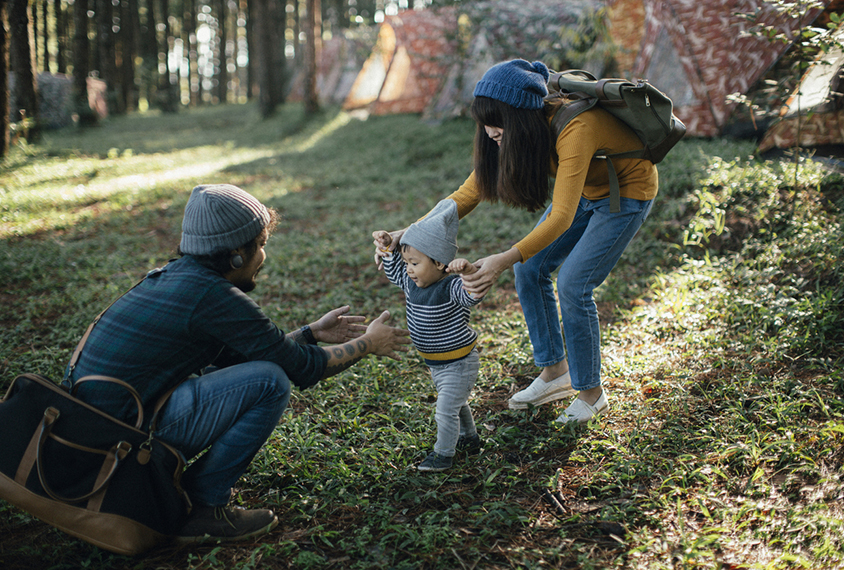
staticnak1983 / iStockphoto
Walking doesn’t deliver language gains for children with autism
Children with autism do not show the burst of vocabulary growth that usually accompanies learning to walk.
Children with autism do not show the burst of vocabulary growth that usually accompanies learning to walk, according to a new study1.
The findings add to mounting evidence that motor development is linked to social and language skills in children with autism.
Walking gives toddlers an efficient way to explore their environment and initiate social interactions. Studies show that language skills typically blossom after children take their first steps2. Many children with autism have atypical gaits, however. And those who show early signs of motor problems tend to be slow to develop language skills3.
The new work suggests that regardless of when children with autism learn to walk, they do not show the same vocabulary gains that their typical peers do.
“For whatever reason, [children with autism are] not benefiting from the onset of walking in the same way as other infants,” says lead researcher Jana Iverson, professor of psychology at the University of Pittsburgh in Pennsylvania.
The study also highlights the need for more research into motor development in children with autism.
“Beginning to look more closely at other motor skills and the relationship between motor skills and language development is really important,” says Catherine Lord, director of the Center for Autism and the Developing Brain at New York-Presbyterian Hospital.
Talking points:
Iverson and her colleagues regularly visited 116 children in their homes between 2 and 19 months of age. Of these children, 91 have an older sibling with autism. These ‘baby sibs’ are about 20 times as likely to receive an autism diagnosis as infants without a family history of autism. The other 25 infants were considered ‘low risk.’
During each visit, parents completed a 396-word vocabulary checklist, marking the words that their children understood and the words they produced. The parents and researchers also noted when each child began to walk.
The researchers continued to visit the children at 18, 24 and 36 months of age. At the final visit, they assessed the children for autism and language delay. They diagnosed 15 of the baby sibs with autism and 26 with language delay.
In the four months before they walked, the baby sibs without autism or language delay and the controls both learned the meaning of about 11 new words and spoke an average of 1 new word per month. After they walked, language development in both groups accelerated: They picked up meanings for about 30 new words and spoke 4 new words each month.
Vocabulary gains were more modest in baby sibs with language delay. These children understood and produced relatively few words before they could walk — about six words and less than one word, respectively — and added fewer words per month after they took their first steps than low-risk children.
But the baby sibs later diagnosed with autism showed few vocabulary gains with walking. In each month before they walked, they picked up the meaning of fewer than two new words and sometimes spoke less than one new word. After beginning to walk, they gained about seven new words per month, an increase that was not statistically significant. Their spoken vocabulary grew by slightly more than one word per month. The findings were published 23 October in Child Development.
Walk this way:
Children with autism may not take advantage of walking the way typical children do. “For neurotypical infants, walking is a way of expanding your horizons,” Iverson says. But for children with autism, “walking, for whatever reason, doesn’t open doors for them,” Iverson says. “So that then sets them back even further.”
Children with autism may not seek out the kinds of social or other stimuli that support vocabulary development, Iverson says. They may either lack the motivation to do so or become discouraged because they find walking difficult.
It’s also possible that walking and verbal ability are not causally linked, even in typical development, says Rhea Paul, professor of speech language pathology at Sacred Heart University in Fairfield, Connecticut, who was not involved in the research.
Instead, the brain’s language circuits may not be well established in children with autism, regardless of whether they are walking, Paul says. “I just think it’s taking things a little too far to say that it’s walking that contributes to this spurt of vocabulary.”
Iverson plans to study how the gaits of children at high and low risk for autism change over time, and how these children use their walking skills — where they go and whether they carry objects to their parents, for instance.
References:
Corrections
Recommended reading

New organoid atlas unveils four neurodevelopmental signatures
Explore more from The Transmitter
Snoozing dragons stir up ancient evidence of sleep’s dual nature

The Transmitter’s most-read neuroscience book excerpts of 2025


